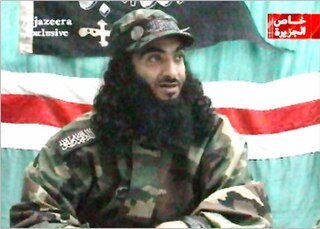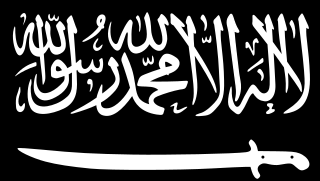Related Research Articles

The Second Chechen War took place in Chechnya and the border regions of the North Caucasus between the Russian Federation and the breakaway Chechen Republic of Ichkeria, from August 1999 to April 2009.
Spetsnaz, are special forces in many post-Soviet states. Historically, this term referred to the Soviet Union's Spetsnaz GRU, special operations units of the GRU, the main military intelligence service. Today it refers to special forces branches and task forces subordinate to ministries including defence, internal affairs, or emergency situations in countries that have inherited their special purpose units from the now-defunct Soviet security agencies.

Shamil Salmanovich Basayev, also known by his kunya "Abu Idris", was a North Caucasian guerilla leader who served as a senior military commander in the breakaway Chechen Republic of Ichkeria. He held the rank of brigadier general in the Armed Forces of Ichkeria, and was posthumously declared generalissimo. As a military commander in the separatist armed forces of Chechnya, one of his most notable battles was the separatist recapture of Grozny in 1996, which he personally planned and commanded together with Aslan Maskhadov. He also masterminded several of the worst terrorist attacks that occurred in Russia.

Spetsgruppa "A", also known as Alpha Group, or Alfa, whose official name is Directorate "A" of the FSB Special Purpose Center, is a stand-alone sub-unit of Russia's special forces within the Russian Federal Security Service (FSB). It was created by the Soviet KGB in 1974. Although little is known about the exact nature of its primary directives, it is speculated that the unit is authorised to act under the direct control and sanction of Russia's top political leadership, similar to its sister unit, the Directorate "V" (Vympel), which is officially tasked with protecting Russia's strategic installations, as well as conducting black operations inside and outside Russia. It is also available for extended police duties, for paramilitary operations, and for covert operations, both domestically and internationally.
The Beslan school siege was a terrorist attack that started on 1 September 2004. It lasted three days, and involved the imprisonment of more than 1,100 people as hostages, ending with the deaths of 334 people, 186 of them children, as well as 31 of the attackers. It is considered the deadliest school shooting in history.
Black Widow or Shahidka, is a term for Islamist Chechen female suicide bombers, willing to be a manifestation of violent jihad. They became known at the Moscow theater hostage crisis of October 2002. The commander Shamil Basayev referred to the shahidkas as a part of force of his suicide bombers called the Riyad-us Saliheen Brigade of Martyrs. Basayev also stated that he himself trained at least fifty of the Black Widows. The female suicide bombers have carried out over 65% of the 23 terrorist attacks linked to the Chechen movement since 2000. The Black Widows are associated with terrorist attacks in Chechnya between 1999 and 2005.

Ali Musaevich Taziev, also known as Akhmed Yevloev, Magomet Yevloyev, and Emir Magas; born 19 August 1974) is the former leader of both the Ingushetia-based Ingush Jamaat and as the military wing of the Caucasus Emirate. On 30 September 2006, Taziev was appointed to the post of commander of the Caucasian Front by the orders of Dokka Umarov. In July 2007, one year after Shamil Basayev’s death, Taziev became his official successor as the most high-ranking military commander in the rebel forces. He is believed to be personally responsible for the death of several local high-ranking security officials.
Nur-Pashi Aburkashevich Kulayev is a Russian terrorist and the sole survivor of the 32 hostage-takers in the 2004 Beslan school hostage crisis. A native of Nozhay-Yurtovsky District, Chechnya, Kulayev was a 24-year-old unemployed carpenter at the time of the attack. His brother Han-Pashi Kulayev had formerly served as bodyguard for Shamil Basayev.

The 2005 raid on Nalchik was a raid by a large group of Islamic militants on Nalchik, in the Kabardino-Balkar Republic (KBR) of southern Russia, on 13 October 2005.

Doku Khamatovich Umarov, also known as Dokka Umarov as well as by his Arabized name of Dokka Abu Umar, was a Chechen mujahid in North Caucasus. Umarov was a major military figure in both wars in Chechnya during the 1990s and 2000s, before becoming the leader of the greater insurgency in the North Caucasus. He was active mostly in south-western Chechnya, near and across the borders with Ingushetia and Georgia.
In June 2000, the North Caucasian Chechen separatist-led Chechen insurgents added suicide bombing to their tactics in their struggle against Russia. Since then, there have been dozens of suicide attacks within and outside the republic of Chechnya, resulting in thousands of casualties among Russian security personnel and civilians. The profiles of the suicide bombers have varied, as have the circumstances surrounding the bombings.

Abu al-Walid was a Saudi Arabian of the Ghamd tribe who fought as a "mujahid" volunteer in Central Asia, the Balkans, and the North Caucasus. He was killed in April 2004 in Chechnya by the Russian federal forces.

Melfi Al Hussaini Al Harbi, more commonly known as Muhannad, and also known as Abu Anas, was a Mujahid Emir (commander) fighting in Chechnya. Following the death of Abu Hafs al-Urduni on 26 November 2006, he was named leader of the battalion of foreign fighters once commanded by the notorious Saudi-born Ibn al-Khattab.
Ruslan Tagirovich Khuchbarov, was an Ingush militant nicknamed "Polkovnik" notorious for his leading role in the 2004 Beslan school hostage crisis.

Riyad-us Saliheen was the name of a small "martyr" (shahid) force of suicide attackers. Its original leader (amir) was the Chechen separatist commander Shamil Basayev. In February and March 2003, the group was designated by the United States and subsequently by the United Nations as a terrorist organization. After several years of inactivity, Riyad-us Saliheen was reactivated by the Caucasus Emirate in 2009 under the command of Said Buryatsky; following his death, Aslan Byutukayev became its new leader.
Khuseyn Vakhaevich Gakayev, also known as Emir Mansur and Emir Hussein, was a mujahid Emir (commander) fighting in Chechnya. He was one of the most senior field commanders still operating in the North Caucasus prior to his death on 24 January 2013.
Tarkhan Ismailovich Gaziyev, also known as Emir Tarkhan, is a Chechen militant commander who has fought in the Insurgency in the North Caucasus. The United States Department of State added Gaziyev to its list of Specially Designated Global Terrorists on 29 September 2015.
The 2010 Tsentoroy Attack was an insurgent operation carried out on the morning of 29 August 2010 by Chechen rebels in Tsentoroy, Chechnya, the home village and stronghold of pro-Moscow Chechen President Ramzan Kadyrov. The assault - which represented the largest and most audacious attack launched in the republic for over a year - is considered to have "shattered" the image of Kadyrov's unshakeable rule in Chechnya, as it was the first time in six years that his seemingly impregnable village had come under attack.
Omar (Umar) Sheikhulayev, also known as Emir Muaz, was the militant leader of the Vilayat Dagestan of the Caucasus Emirate, in the volatile southern Russian republic of Dagestan.

On 4 December 2014, a group of armed militants of the jihadist organization Caucasus Emirate attacked a traffic police checkpoint outside the city of Grozny, Chechnya, Russia. The militants then entered the city and occupied the "Press House" building in the city center and a nearby school.
References
- 1 2 3 4 5 "HOSTAGE TAKERS KILLED IN BESLAN". GlobalJihad.net. 26 February 2008. Archived from the original on June 13, 2010. Retrieved 11 July 2011.
{{cite news}}: CS1 maint: unfit URL (link) - ↑ "В результате многоходовой операции спецслужб в Чечне уничтожен канадский инструктор-подрывник. Канадец арабского происхождения Халил Рудван приехал в Чечню из Дагестана, куда попал по туристической визе из Азербайджана". Российская Газета. 9 October 2004. Archived from the original on July 12, 2011. Retrieved 11 July 2011.
{{cite news}}: CS1 maint: unfit URL (link)